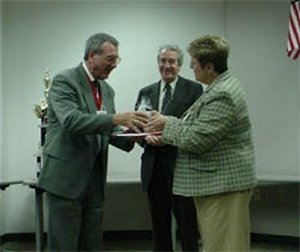SACS CASI Team Finds GM ‘Highly Effective’
Accreditation Committee Visit Yields
Commendations and Recommendations
By Margaret Lipman (November 25, 2005)
Following
an intensive examination of all of Mason’s programs, a three-person
accreditation team from the Southern Association of Colleges and
Schools Council on Accreditation and School Improvement (SACS CASI)
has termed the high school “highly effective” and recommended continued
accreditation.
In
the few days preceding the Thanksgiving holiday, the quality assurance
peer-review team visited GM to formulate its report on the school’s
accreditation status, strengths, and weaknesses.
 |
GMHS has been accredited by SACS CASI since
1954, and this year, it appears, will be no different. SACS CASI accredits over 13,000 schools throughout
11 southern states and Latin America (predominantly American-International
schools); the organization’s mission statement is "to help
schools improve student learning through accreditation."
SACS
CASI is the world’s largest non-governmental accrediting agency;
involvement with SACS CASI is a voluntary committment, although
the benefits of accreditation are irrefutable. Accredited
schools have the privilege of access to a wide variety of additional
educational resources, ease in transferring student grades/credit
among schools, student access to a variety of programs and scholarships,
and a commitment to achieving and maintaining high standards
of educational practice.
|
|
Assistant principal Dr. Monika Bilby, right, thanks SACS CASI chairman
Mr. Den Boyd for the committee’s work as principal
Bob Snee looks on. (Photo by Margaret Lipman)
|
The
accreditation process revolves around three requirements: meeting
a specific set of accreditation standards: engaging in a process
of continual improvement (including documentation of the school’s
current progress, future goals, and plans for achievement), and providing
for quality assurance through both documentation of student accomplishments
and a peer review at least once every five years.
Mr.
Den Boyd chaired the collegial-review team, which also consisted
of Ms. Laura Kelanic, a math teacher at Wakefield High School, and Mr. Dave Roylance, a
former IB coordinator in Fairfax, Virginia. On Monday and Tuesday, they met with school
administrators and faculty and visited a variety of classes. At a special faculty meeting on Tuesday afternoon,
the team members shared their impressions of George Mason, including
areas of both commendation and recommendation. They
also declared that they would be forwarding their recommendation
of continuing GM’s full accreditation to SACS CASI for the final
vote on accreditation next month.
“We
never have trouble trying to find commendations, but we do have to
stretch to find recommendations,” commented Boyd about GM as he addressed
a gathering of almost the entire faculty.
Kelanic
presented the team’s commendations of GM. They
were impressed with the school’s safe, secure, well-maintained, and
open learning environment, the dedication of the teaching staff to
accommodating student needs, the use of creative programs and strategies
such as the Mustang Ambassadors, the Teacher Advisory period, and
small class sizes. They also praised Mason’s tradition of personally
recognizing student achievement, the wide participation in IB, AP,
and CP classes, and the extensive curricular and extracurricular
activities--specifically citing Lasso Online--that accommodate a
wide range of student interests and needs. The
team concluded that the transition into an 8-12 high school had been “very
successful” and commended the school’s utilization of technology,
as well as its community involvement through a large PTSA and several
Booster groups.
Roylance
presented the committee’s suggestions of “opportunities for growth” at
GM. He suggested continuing to close the “achievement
gap” between student populations, increasing the specificity of the
GMHS plan for improvement, setting aside more planning time for teachers,
assisting students in making appropriate decisions to manage their
level of stress, and addressing the misconceptions about the IB program
versus the CP program.
At the conclusion of the team’s
presentation, Boyd addressed the assembled faculty again. “[We
would like] to commend the students, staff, and parents for their continued
dedication to the improvement process,” Boyd commented. He was hopeful that the committee’s visit and
GM’s continued participation in the SACS CASI accreditation process
would lead to “enhanced learning and achievement” for Mason students.


